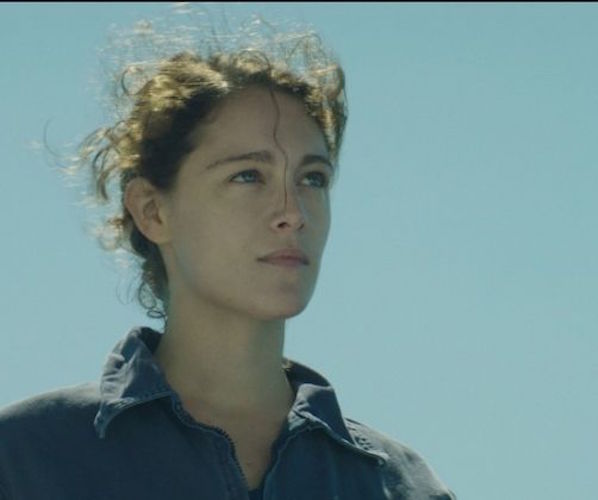Film Review: “Fidelio: Alice’s Odyssey” — Obsessively Sexual
This film, written and directed by Lucie Borleteau, is not exactly feminist, nor need it be.
Fidelio: Alice’s Odyssey, written and directed by Lucie Borleteau. Screening in the Harry and Mildred Remis Auditorium at the Museum of Fine Arts, Boston, MA, through October 1.

A scene from “Fidelio: Alice’s Odyssey,” screening at the MFA Boston this week.
By Gerald Peary
Like the randy Odysseus, Alice (the appealing Ariane Abed) has a hard time keeping her pants on while at sea in the arresting, sexually charged French feature, Fidelio: Alice’s Odyssey. “I’ve screwed on all five continents,” she brags during a bull session with the otherwise all-male crew of the cargo ship, Fidelio. “And you’d be surprised about Asians,” she adds. “They have big dicks.”
At the very beginning of the film, Alice, 30 or so, looks ripe to settle down, as she’s fallen for Felix (Anders Danielsen Lie), a young Norwegian comic book artist. For Alice, loving someone is madly desiring them, and so our introduction to this couple is them coupling on a beach. How obsessively sexual is this movie? Already as the credits roll, the conversation travels below belt. Felix: “I like your pussy.” Alice: “I like when you lick my pussy.” But their torrid romance is abruptly interrupted, as Alice must set sail on the Fidelio, headed from Marseilles to East Africa. We next see her aboard ship in a sexless zip-up outfit for her grunt job as a second engineer.
This film, written and directed by Lucie Borleteau, is not exactly feminist, nor need it be. (Borleteau in an interview: “To me, films with a big climax in which a character overcomes sexism are old-fashioned.”) But, as with Claire Denis’s masterpiece Beau Travail, which is set among the French Foreign Legion, Borleteau stretches her female vision to situate her film, and plausibly, in the male domain of shipboard work and sailor camaraderie. When not about Alice’s erotic life, the film floats along with casual scenes of daily existence aboard the Fidelio, bridge passages not intended to be especially dramatic. I could be wrong, but some of the cast, especially the Filipino ones, feel like bonafide crew given lines to say. In other words: Borleteau has put a real ship out to sea. This ship lands in Senegal, and there is a wonderful extended scene in a Dakar nightclub, with all the Fidelio staff dancing joyously to an African beat.
Meanwhile, there’s horny Alice masturbating in her lonely bed. She pines for Felix but she’s distracted by handsome Gaël (Melvil Poupaud), her former boyfriend who is the boat’s captain. (It’s like a Marlene Dietrich love triangle.) Gaël tries to rekindle their romance, though he’s now married. She resists until she can’t. More hot sex scenes. Alice’s head is spinning. Maybe it’s Gaël she really loves? As the ship returns to Marseilles, he confesses he’s getting divorced. Why didn’t he say? “I didn’t want to spoil the fun.” It was easier for Alice, he realized, not knowing that they actually could be together.
“What happens on ship, stays on ship,” Alice tells him. Amazingly, when she meets Felix on land, she doesn’t hesitate to kiss him greedily. Gaël, so important to her, seems instantly forgotten, and Felix has her complete attention. That is, until he gloomily discovers the affair.
The last act of Fidelio is sad, and profound. Perhaps more like a man (?), Alice feels guilty only when her cheating has been found out. She tries to win Felix back, pleading with him, “There are guys everywhere, you’re the one who grounds me.” But he has been shattered, and Alice once again sets out to sea. Life is about love and work, but is it a consolation that now, a great promotion, she is chief engineer of the Fidelio? Alice believes she still wants Felix, but it is Felix, the least experienced character, who grasps a great wisdom about love relationships: “Feelings change all the time.”
Gerald Peary is a professor at Suffolk University, Boston, curator of the Boston University Cinematheque, and the general editor of the “Conversations with Filmmakers” series from the University Press of Mississippi. A critic for the late Boston Phoenix, he is the author of 9 books on cinema, writer-director of the documentaries For the Love of Movies: the Story of American Film Criticism and Archie’s Betty, and a featured actor in the 2013 independent narrative Computer Chess
